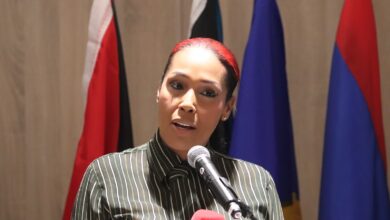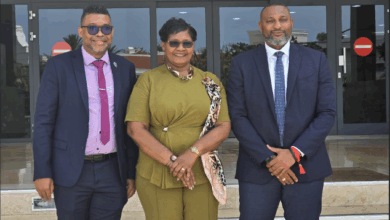Mr. Chairman, Hon. K.D. Knight, Minister of Foreign Affairs and Foreign Trade, Jamaica
Outgoing Chairman, Hon. Clement Rohee, Minister of Foreign Trade and International Cooperation of Guyana
Hon Billie Miller Deputy Prime Minister and Minister of Foreign Affairs and Foreign Trade of Barbados
Other Honourable Ministers
Ambassador Richard Bernal, Director-General of the Regional Negotiating Machinery (RNM)
Distinguished Delegates
Members of Staff of the Secretariat
Members of the Media
Ladies and Gentlemen
It is with great pleasure that I welcome you all today to the Thirteenth Meeting of the Council for Trade and Economic Development. I extend a special welcome to the Hon. John Rahael, Minister of Agriculture of Trinidad and Tobago who is attending his first Meeting of the Community.
It is only fitting as we gather here today that we acknowledge the sacrifice and achievements of the Government and people of Guyana as they host the Community on this most significant day in their history – the 36th Anniversary of Independence of Guyana. We wish our gracious host a most happy birthday, along with good economic, political and social health on the road to prosperity.
But Guyana’s is not the only birthday that is being commemorated today as one of the world’s major faiths, Islam, celebrates the birth date of its great Prophet Muhammad (Upon Whom Be Peace). On behalf of the Community, I extend warm and fraternal greetings to our Muslim brothers and sisters on the occasion of this important observance – Youman Nabi.
Ladies and Gentlemen, as I look around this room, it is a cheering sight to see the cross section of the Community that is on hand to participate in our deliberations. I take particular note of the private sector whose participation at the level of the officials certainly enhanced the discussions. I look forward to a similar contribution at this Ministerial stage of the proceedings. Their role is vital if we are to make a success of the Single Market and Economy and be able to do battle successfully in the external arena within the minefield of negotiations which we face. So also is Labour’s and in our recent work Labour has been conspicuously present and contributory.
Representation by our regional organisations has been no less important and they too have played a major role in the preparatory sessions to this Thirteenth Meeting of the Council for Trade and Economic Development. These contributions are a fitting complement to the work of our devoted and hardworking officials from Member States, the RNM and the Secretariat. These combined efforts have led to a depth of preparation which should ensure a focussed Ministerial session as the Community moves into implementation mode.
And that, I submit, Mr Chairman, Ladies and Gentlemen, is the mode in which we must approach all our work in the councils of the Community. With the studies, the reports, the reviews, the proposals and the recommendations in our hands, the time must now be used in determining how best to implement them and then in moving forward to so do.
Against this background we must recall that the Community has set the Single Market and Economy as the core element in its response to globalisation and its attendant challenges. The decisive decision taken by Conference at the Inter-Sessional Meeting in Belize in February to accept the recommendation of this Council and to establish the Programme for he removal of restrictions on the movement of capital, investment and services from March 1 2002 is of signal importance to the future development of our Community. This programme gives an outside deadline of 31December 2005 for the removal of the final restrictions. But moreover it has been front loaded as each Member State has undertaken to remove the vast majority of restrictions by December 2003. While it took us much longer than was anticipated to agree on the programmes , this Council and indeed the individual Member States can be justly proud of the detailed work and consultations which underpin this agreement.
The Community has also agreed that there will be a regional approach to external economic negotiations. In that regard the move to complete the implementation of the measures establishing the Single Market and Economy will create the solid, cohesive front necessary to participate as a single Community in the many fast-approaching external economic negotiations.
In this Community life-saving enterprise time is unfortunately not on our side. This is being more and more recognised by various sectors of the Community. The recent Caribbean Transnational Conference held in Montego Bay, Jamaica last month, stated as one of its recommendations that:
- the time 2005 is too late to complete the implementation of the CSME. Heads of Government and the COTED should consider adjusting the implementation schedules to advance the completion date. The private sector is willing to do whatever it can to assist the achievement of an earlier target date.”
I am glad to see that one of those involved in making that recommendation, namely the private sector, has expressed its willingness to “do whatever it can to assist the achievement of an earlier target date.” It might have been even more reassuring if it were able to say “they’ll do whatever it takes” but we’ll settle for whatever it can.
Two other critical recommendations emanating from that same occasion which must be fully implemented without any further delay relate to the speeding up of the process of accreditation and the resulting free movement of skilled/professional workers and a more structured relationship between the COTED and the private sector to allow for on-going dialogue.
I sincerely hope that the recent Transnational Conference, the work of the advisory committee to support the CSME and the Forward Together Encounter to be held here in Georgetown in July are all indications that we have finally come to grips with the reality that we are all in this together and moreover that time is of the essence.
That hope also rests on the many requests being made of the Secretariat to provide information and to participate in national, sectoral and group discussions on the CSME.
Ladies and Gentlemen, the Secretariat regards the discussions and proposals as critical since we need to keep our self-imposed schedules. These are just as important, if not more so, than those schedules to which we are committed in our external negotiations. It beggars belief, not to mention credibility, if we were to strive to meet our international commitments while neglecting those to the Community.
This Council’s wide encompassing competence involves it not only in agriculture, tourism, transportation and sustainable development but also in matters relative to external economic relations as well. Against this background, the World Food Summit in June, the World Summit on Sustainable Development to take place from August 26 -September 4 this year, and a number of international negotiating activities scheduled between now and September, are all for consideration at this session of Council. This meeting therefore provides a timely opportunity for the Community to finalise its preparations. For small developing states, like ours, the outcome of these encounters in the international community are of particular importance and our preparations must therefore be focussed so as to get the maximum possible benefits.
Mr Chairman, Ladies and Gentlemen, as I have said earlier, time is of the essence and given the limited amount available to us here, and indeed in the wider scheme of things, we must insist on making the best use of it. I will follow my own counsel and therefore take no more of it than is required to thank you and to invite the outgoing Chairman of COTED the Hon. Clement Rohee, Minister of Foreign Trade and International Co-operation of Guyana to address us.
27th May 2002





